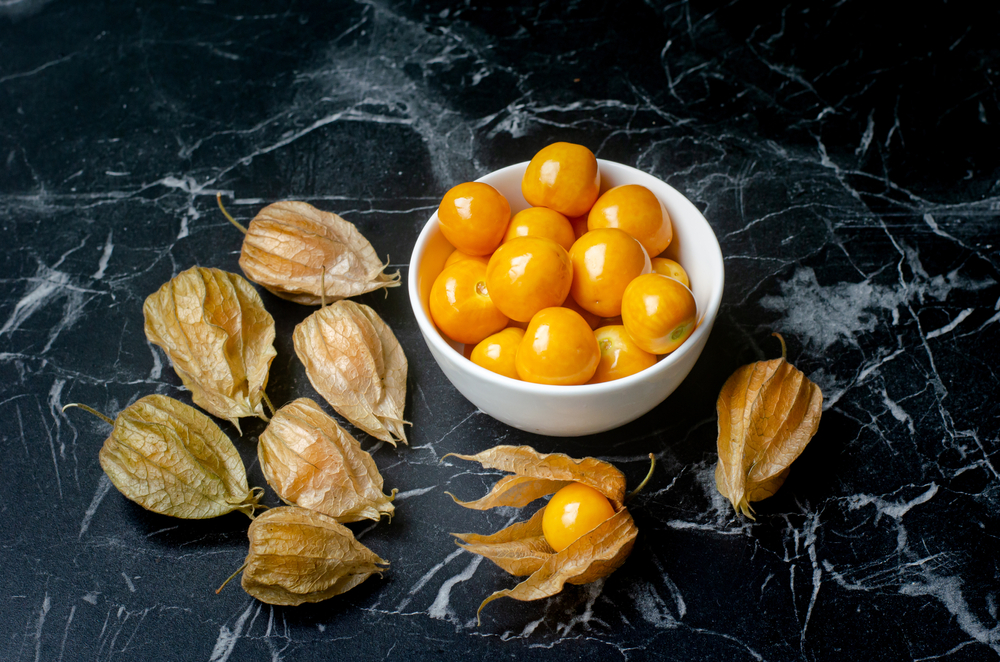In this article
View 4 More +Your dog might beg you to share your food with them, but it’s always best to do your research first to ensure that the food doesn’t contain any dangerous ingredients. One increasingly popular food that people might wonder about is golden berries, or Physalis. These are the fruit of Physalis peruviana plant, a species of nightshade family that is native to Peru.
Fortunately, golden berries are usually safe for dogs, in small amounts when ripe. Keep reading for factual answers to frequently asked questions about the pros and cons of feeding golden berries to your dog, along with serving tips and safe alternatives.

What Are Golden Berries?
A golden berry is a round fruit ranging from 1/3 to 3/4 inch in diameter. When still on the plant, the fruit has a papery sheath that resembles a Chinese lantern. It’s golden yellow in color and has a sweet-tart flavor.

The 9 Benefits of Feeding Golden Berries to a Dog
1. Low in Calories
Golden berries are relatively low in calories, making them suitable occasional treats for dogs, especially those watching their weight.
2. Vitamin A
The Vitamin A in golden berries can play a role in maintaining healthy skin, coat, and vision in dogs. It also supports immune function.
3. Vitamin E
While not present in high amounts in golden berries, vitamin E is an antioxidant that helps protect cells from damage. It supports the immune system and skin health in dogs.

4. Vitamin K
Vitamin K is necessary for proper blood clotting and bone health.
5. Vitamin C
Dogs can synthesize vitamin C, but supplementation can be beneficial to help support the immune system.
6. B Vitamins
Golden berries contain traces of B vitamins like B1 and B3. These play a crucial role in dogs’ energy levels, metabolism, nerve function, and overall cellular health.

7. Potassium
Golden berries contain potassium, an essential mineral that helps regulate fluid balance, nerve signals, and muscle contractions. Adequate potassium intake supports heart health and overall bodily function in dogs.
8. Phosphorus
Golden berries have phosphorus, an important nutrient for bone health, energy metabolism, and cellular function in dogs. It works in conjunction with calcium to maintain strong bones and teeth.
9. Magnesium
Golden berries contain magnesium, which plays a role in muscle and nerve function, bone health, and various enzymatic reactions in dogs. Adequate magnesium levels are vital for overall well-being.


The 3 Risks of Feeding Golden Berries to a Dog
1. Toxic Compounds
While ripe golden berries themselves aren’t generally considered toxic, the plant, as with all members of the nightshade family (Solanaceae) produces toxic alkaloid compounds such as solanine that are toxic to dogs. These toxins are found in the unripe berries, the stem, the leaves, and the papery sheath. It’s therefore vital that your dog is only given a ripe berry that comes from a safe and reliable source.
Toxic effects of solanine can be as mild as gastrointestinal upset, all the way to heart and neurological problems.
2. Potential Allergies
Dogs can have allergies to certain foods, including golden berries, and introducing a new food can also trigger an allergic reaction. Watch for signs like itching, redness, swelling, or gastrointestinal distress after feeding this fruit to your pet, and contact your vet immediately if you notice any problems.
3. Digestive Sensitivity
Dogs have different digestive systems than humans, and some foods can lead to digestive upset. Golden berries may not agree with your dog so it is important to monitor him after introducing any new foods.


How Can You Safely Feed Golden Berries to Your Dog?
Feed Ripe Fruit Only
The golden rule of giving your dog a golden berry is to make sure it is ripe and to only feed them the orange berry itself. Never feed the stem, leaves, or papery sheath to your dog.
Consult Your Veterinarian
Before making changes to your dog’s diet, consult your veterinarian. They can provide personalized advice based on your dog’s health, dietary needs, and pre-existing conditions.
If you need to speak with a vet but can't get to one, head over to PangoVet. It's our online service where you can talk to a vet online and get the advice you need for your pet — all at an affordable price!
Clean Them Thoroughly
Rinse your golden berries thoroughly before feeding them to your pet in order to remove pesticides and other contaminants.

Start Small
Start by offering a tiny piece of a golden berry. Monitor your dog closely for any adverse reactions over the next 24 hours.
Moderation Is Key
It is anecdotally recommended to limit the consumption of golden berries to one to two per day or five to ten per week.

What Are Alternatives to Golden Berries?
- Blueberries
- Strawberries
- Carrot sticks
- Apple slices
- Pumpkin
- Cooked sweet potatoes
- Plain cooked chicken or turkey
- Green beans
Tips for a Healthy Diet
- Choose a high-quality commercial dog food that’s appropriate for your dog’s age, size, and health needs.
- Follow the feeding guidelines on the dog food packaging to prevent overfeeding. Adjust portions based on your dog’s activity level and weight. If your dog has been neutered, it is important to adjust helping size as their metabolic rate can slow down after being altered.
- Keep chocolate, grapes, raisins, onions, garlic, and certain artificial sweeteners (especially xylitol) out of your pet’s reach.
- Establish a regular feeding schedule to help regulate your dog’s digestion and prevent overeating.

Summary
Ripe golden berries are not toxic to dogs, and you can serve them in small quantities as occasional treats. Many dogs enjoy the flavor and will receive beneficial vitamins and minerals, including vitamins A, E, K, magnesium, and potassium. The berries must be ripe, though, and be aware that other parts of the plant are toxic, so your pet shouldn’t eat them. Call your vet immediately if you notice any signs that your dog is having an allergic reaction after eating a golden berry.
Related reads:
- Can Dogs Eat Huckleberries? Vet Reviewed Facts & FAQ
- What Berries Can Dogs Eat? Vet-Verified Nutrition Facts & FAQ
Featured Photo Credit: Noi Pattanan, Shutterstock






















